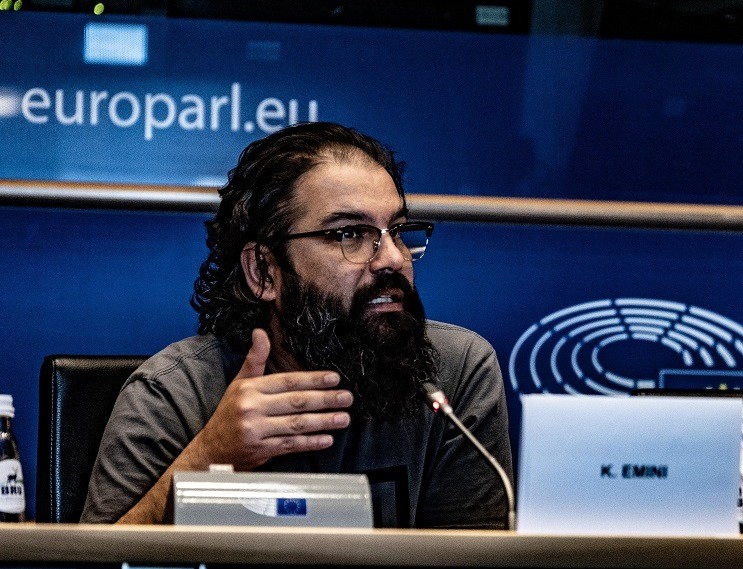Kenan Emini is a Roma refugee from Kosovo to Germany. He is the chairman of Roma Center e.V., co-chair of Bundes Roma Verband (Federal Roma Association), founder and director of the Roma Antidiscrimination Network (RAN). Mr Emini is the main initiator and organizer of the last World Roma Congress in Berlin (2023). He is author of the documentary film “The Awakening” about the situation of deported young Roma in various countries, the young people threatened with deportation in Germany, and the shift to the right in Europe. He has organized numerous research trips on the situation of the deported Roma in Serbia, Kosovo, Macedonia, Poland, Czech Republic and also on the situation of Roma refugees from Ukraine.
It was never the intention of the EU that Roma should position themselves politically. Instead, there were always only projects to promote education and other “integration” topics. The focus was always on integration without considering that the real problems lie elsewhere: namely, in institutional and structural discrimination, right-wing extremism, and the deprivation of Roma rights. If politics and European Roma organisations had focused on these issues and built structures, the situation would look different now.
Over time, the European Roma organisations in Brussels have turned out to be Mickey Mouse organisations. They have no influence; they have been sleeping for the last 20 years, wasting their time with youth meetings and useless conferences, never addressing the real problems. An example: for 20 years, we have been trying to bring the expulsion of almost all Roma from Kosovo – their rape, murder, torture, and trauma – to public attention and to the political agenda. But there was never any support from these organisations. There was only silence on this issue. And we are talking about ethnic cleansing, severe violence, and theft of property. And no one cares, even though the problem is still current. Even when we wanted to hold an event in the European Parliament on this issue, these organisations tried to sabotage our event. Instead, they prefer to award prizes to the “most Roma-friendly” mayor. These organisations have no influence at all. There would have been a chance to question this, discuss more meaningful measures, build structures, and establish representatives. But instead, the real problems of the Roma communities have been ignored for 20 years, and now we are left with the mess.
At the same time, a lot of money is spent on “integration projects” against for Roma, only a small proportion of which work. Most of them are a disaster. The projects completely ignore the real problems and needs of the people and fail. These funds are used by municipalities and Gadje organisations that have no access to the community and no idea of the community’s problems. The Roma organisations are not involved in these measures. Instead of reflecting on why these projects fail, Roma are blamed for the failure of the projects. Because the whole of Europe is in a social crisis, the Roma community can easily be made the scapegoat. These right-wing politicians can then easily exploit this and get elected with propaganda against Roma.
I think nobody cares about the Roma topic in Brussels. Roma don’t have a big lobby. The European Roma organisations should actually take on this task so that MEPs can raise important Roma topics. But they would rather stay in their comfort zone than do decent lobbying work for the community. Which Roma organisation in Brussels deals with relevant, serious issues? Who are the Roma representatives who deal with serious political issues? These questions should have been asked 20 years ago in order to establish proper structures. Ultimately, it is up to us to push the agenda. The seriousness of the situation in which the Roma community finds itself has never been adequately reflected in politics.

As mentioned above, there was a wrong intention from the beginning. They only dealt with “integration” instead of naming the real causes from the outset. In many countries, problems such as racism against Roma (“antiziganism”) are still not an issue today. They are completely underdeveloped when it comes to coming to terms with their own past (e.g. enslavement of the Roma, involvement in the Holocaust and the entire persecution of the Roma to this day). The fundamental issues are tough and people don’t want to touch them: Racism, persecution, the involvement of one’s own society, war and expulsion, war crimes, police violence, institutional discrimination… Who deals with them? The problem is not addressing topics in the Western Balkan states and Ukraine – we do that too. The problem is that these organisations deal with the issues in these countries that are currently in vogue, rather than the fundamental issues. For example, we fear that the history we experienced in Kosovo will repeat itself in Ukraine: that Roma will be expelled and will never be able to return. The situation in Ukraine before the war, i.e. the aggressive right-wing extremism, the pogroms against Roma, are being completely dethematised.
The European Roma organisations have completely failed to establish structures to exert any serious influence. They have not built a staff of experts who can deal with the important issues at a high level. In my opinion, it is important to build such expert staff on all important topics. There are many experts from the Roma community, but they have never been involved. At the moment, everything always depends on individual people and so nothing can change. I don’t believe in one person, because they can always be manipulated. Other mechanisms are needed here.
![]()
Discover more from EU Romapress
Subscribe to get the latest posts sent to your email.


